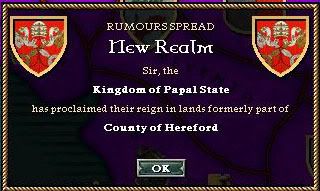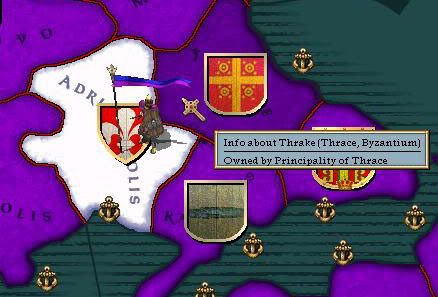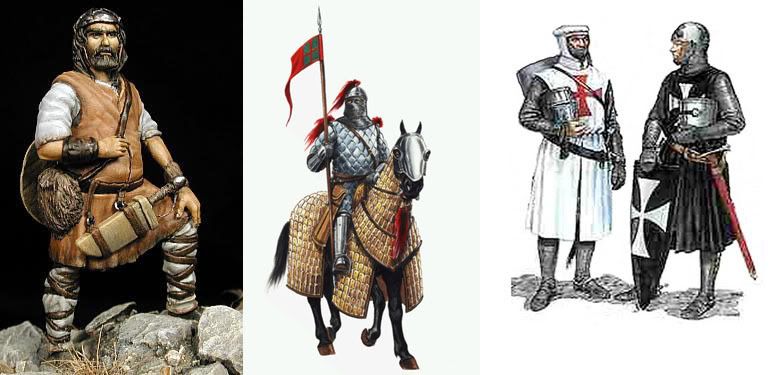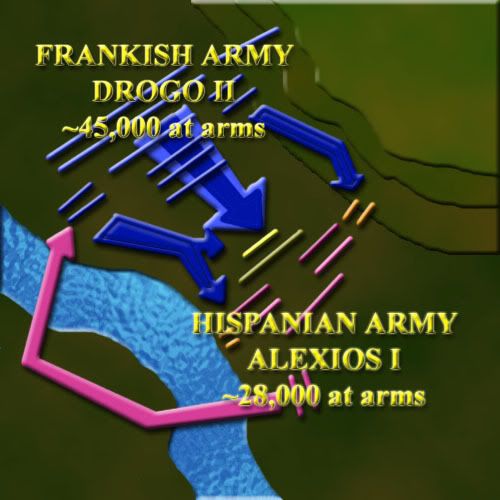Hi everyone! I’m finally back after a long and exhausting weekend. Updates for the next couple weeks are going to be a little slow, as I have a series of funerals I have to go to. However, all is not lost… I have been busy! I’m relinking the earlier theme songs that don’t work at present, and in lieu of the lateness of the update, I do have one teaser for you all as well. Also, for the person who asked if there’s going to be a title pic for the Manuel years, yes, there is, I just haven’t gotten around to putting it up yet.
This is my selection for someone’s theme (someone you’ve already met, who is a major character). You all will find out soon who it is. Bonus points for people who can name the song this comes from!
Eron12 – Alexios in game is King of Portugal and Mauretania, but I decided these were Byzantine enough, hence the Exarch titles. Considering his power in Spain, as well as arguably more legitimate claim to the Imperial title, it made sense story wise that he’d just go on and claim the Imperial title as well! Alexios’ line of inheritance to France and England is murkier, as Louis now has a son.
von Sachsen – Welcome to the AAR, I’m glad you like it! Feel free to go ahead and say what you like about things as you read along. Its fun for me to hear about how people like or dislike events from way back!
VILenin – I think a new villainess is on everyone’s target list now.
 Antoku
Antoku – Falling irony inflicts 126d6 damage on your character. You’re done.
In all seriousness, wine has been used so much since Manuel’s day that I think
everyone is wary of it. One can say many things about Manuel, but his tactics have become very much in vogue…
The_Guiscard – Heraklios did indeed show himself to be foolish. He had great stats to begin with, but he matured into an Amateurish Pettifogger with traits such as Trusting. In the cutthroat court of Konstantinopolis, such a character is bound to fall sooner rather than later.
Nikolai – Rome at this point isn’t much of a city – not after Thomas’ legions finished with it… it makes no sense to move the capital there, not when the Emperor’s power, prestige, and the troublesome nobility lie in the East…
Dimmimar – If Thomas had remained alive long enough, he likely would have tried to move the capital to Italy. Don’t put such delusions of grandeur past some of his successors, though…
AlexanderPrimus –There are a whole slew of problems, including the cancer that will ultimately break things apart slowly spreading even more in Christina’s attempts to hold power…
Servius Magnus – Quite a hitlist! Alienor has little power right now though – not with someone of Sophie’s reputation in court, and her son being of age. Alexios is completely in control of his court in Spain. As for being in control of Spain, we’ll see soon!
Enewald – Something tells me that the War of Knives (I’m still looking for a suitable name for the assassin war between Thomas and Rodrigo) will serve as examples of what to do, and what not to do, for assassins for centuries to come…
vanin – Well, the title of this chapter is the Second Komnenid Civil War. And yes, you’re right – things are coming to head, and off in the distance, there are the sounds of distant drums… However, its still too soon to call the Empire dead, not unless poor leadership and bad luck continues for a couple more decades. The Empire’s leaders might have been foolish, but the bureaucracy of Manuel and Basil is still in place, for now…
Irenicus – Leo is definitely playing with fire, but also keep in mind, despite his faults, he’s survived many decades in Roman politics. Sometimes by the bare skin of his teeth (such as when Basil refused to off him despite his blatant treachery), but he’s survived. As for the Spanish monarchy on the new map, it won’t quite be the same thing… you’ll have to see!
Ksim3000 – There’s a new banner coming. It’s not ready yet, and it won’t appear this update, but I’ll come back and apply it when its done! Also yes, Basil is Basil III because Basil Bulgarontocus was Basil II. The numerations of Emperors starts where we left real history (Constantine X) and then goes from there (so if there's another Michael, it'll be Michael VIII, if there's another Demetrios, he'd be Demetrios II, etc.)
Deamon – Maybe a little harsh – then again, he started with a lot of promise and died a fool, so…
Fulcrumvale – It could’ve been Drogo, but then again, Christina was originally Drogo’s agents as well. If he’d tried to buy out Heraklios, that means Drogo knows Christina is after him. That too will be sorted out, update after this one…
 asd21593
asd21593 – Thought you might like it!
 Qorten
Qorten – Either cure each other, or calm each other’s madness. Then there’s always the chance their madness fuels on one another, and they both end up going completely and utterly nutzo…
The_Archduke – Helene becomes important, yes. As for Acheron, as you shall soon see, he soon has some company…
RGB – I’d agree, they’ve been quite foolish!
==================*==================
From Dr. Janet Lithgow’s essay, “
Untold History of Empress Christina”:
“…On the news of the death of Heraklios Komnenos at the hands of assassins from Italy, Christina Komnenos nee Dau was proclaimed Regent in the name of her young son, Thomas II, now recognized as sole Emperor in Constantinople. Even though only a few years later the truth of the death of Heraklios Komnenos came into public light, at the time it made perfect sense for a sharp and dedicated woman like Christina of Dau.
Call it what you wish – contemporary chroniclers call it bloody murder, the future Italian prince Niccolo Machiavelli of Toscana called it genius – but the murder of Heraklios Komnenos in one moment shoved aside an ally-turned-enemy, and rallied the state behind her and her son. The Imperial Army at the urging of Georgios Komnenos and the reluctant old warrior Clemente Kosaca gave its vocal and public backing to the mantra “One Empire, One Emperor,” with young Thomas II as said Emperor. The heinousness of the act, as well as the less than pious nature of its alleged perpetrator, easily swayed the Church into backing the state as well. The
dynatoi, as they were always prone to doing in such situations, dragged their feet, but with the power of army and church, they were not able to resist.
The Empress spent the rest of 1202 and the entirety of 1203 further securing her position in Konstantinopolis, first by promoting those already loyal to her. The aged Clemente Kosaca, last of the “Young Lions” of the 1160s, was retired with great pomp and ceremony, and granted lordship over the cities of Tunis and Carthage in thanks for his decades of work. This naturally left an opening at the powerful position of
Megos Domestikos, a position swiftly filled by Christina’s ally and lover Georgios Komnenos, Prince of Antioch. She also swiftly granted a new strip of territory in the Levant to the Patriarch of Jerusalem, and offered to send legates to one of the new Popes – should one’s legitimacy outweigh the other – a move that has been applauded in some religious circles that were aghast at Thomas I’s assault on and destruction of Rome.
Innocent III originally intended for the Curia to reestablish itself in Trier. Indeed, Clement VIII was elected Pontiff in that ancient and renowned city. However, the convenient deaths of several influential Cardinals, as well as the need for a dedicated location to house the Papacy and the offices of the Church, meant that in January o 1204 the Holy See moved to Hereford. According to rumor, Drogo Capet, as de facto King of England, leaned hard on his tiny Welsh neighbor to surrender the county to Papal control. Many Cardinals are upset at this, feeling this puts the Holy See at the mercy of the King of the French. These Cardinals have openly elected Honorious IV as a new Pope, based out of Hamburg and backed by Swedish arms.
The Empress also swiftly moved to appease or destroy elements of the
dynatoi that were not utterly and completely faithful to her new Regency. The
comes of Adrianople, Nikolaios Droulenos, had been a longtime friend and confidante of Thomas I, and had spent most of the fall of 1202 slowly gathering some of the late Emperor’s allies together in a tentative alliance to strip Christina of her powers and gain the Regency for themselves. The Empress responded decisively, waiting until almost all the conspirators were gathered in the villa of one Heraklios Bryennios before burning the building down. Droulenos desperately declared his cause public, and fled to Adrianople to raise an army, but his short lived rebellion was crushed when troops of the
Hispanikon tagmata seized him on February 8th, 1204. The Empress reportedly dryly remarked, “Let a fool like him die a fool’s death,” and sentenced him to be tossed into the Bosphorus, his ankles tied together with two bags of gold pillaged from his dead allies tied to his arms.
The Empress also pacified the
dynatoi that could be bribed, granting new rights to the nobility in the name of her young son. By the new
Nomas Thomas, twenty
dynatoi selected annually by the Emperor, would be allowed to form an intimate council, called the
Symboulio, which would closely advise the Emperor on matters of state. Even though the members of this body were picked by the Imperial person, it still was a dramatic concession of power on the part of the formerly august position of Emperor. Christina, in the name of her son, publicly reasoned that as Christ’s Viceroy, the Emperor thus had the closeness with God to know who would be a good councilor to his person.
The
Noma Thomas also granted more rights to all the
dynatoi of the Empire. In an effort to increase the response of
dynatoi when troops were called, the Empress offered that in return for certain benchmarks reached in troop muster, a
dynatoi would receive a decrease in taxes. Additionally, to save money the imperial government increasingly turned away from a bureaucratic staff of paid tax collectors in favor of hiring professional tax farmers. Initially this plan was enacted for the more far flung areas of the Empire such as Imeretia and Africa. Its application in the latter area would have disastrous results, as we shall soon see.
The Empress also set about beautifying the city of Konstantinopolis as a sign of her prestige and power, as all previous rulers had done before her. Using her friend Basil Antiochos, Prefect of the City, she seized a large tract of land that had previously been a slum and laid the groundwork for her longest lasting contribution to the Empire – her
Chrysipalati, or Golden Palace. This monumental construction would take over ten years, and be nearly double the size of the Blacharenae palace complex, with new plazas surrounding the immense structure on all sides.
However all of these efforts did not stop the more determined of her opponents. While as she predicted Drogo Capet did launch a great invasion of Spain in the spring of 1204, effectively pinning Alexios Komnenos from acting further east, her main rival for the rest of her reign was not so encumbered. Leo Komnenos, the sextagenarian prince of Apulia, could best be described as the ultimate survivor of the meat-grinder that was Komnenid politics. He’d survived accusations against his character by no less than Sophie Komnenos and Rodrigo Jimenez as early as the 1170s, and as early as the 1180s attempted to backstab his own brother, the warlike Basil, for his own gain, before surviving the purges and mayhem of his nephew Thomas’ reign. “One often does not just win,” the chronicler Honorius Fulva ascribes to Leo, “one often needs to merely survive.”
Leo, as soon as the betrayal of Thomas was complete, wasted little time forming his own powerful coalition. He gathered to his banner most of the princes of southern Italy, all either relatives or close associates, as well as the Prince of Leptis Magna, and quickly set about forming a strong army of
thematakoi to back his hijacked wing of the Imperial Fleet. By Christmas of 1202, his position was strong, as Christina and the Imperial forces were to soon find out.
The Empress had wasted little time either. At the behest of her new ally, Georgios Komnenos, the Imperial
Hellenikon Stratos marshaled in Epirus in the spring of 1204 – 30,000
thematakoi backed by the
Basilikon Toxotoi that had formerly been Heraklios’ bodyguard. She handed the army command to one Isaakios Vataczes, an ambitious
strategos and rival of her lover. In a fell swoop, she removed one of the few potentially disloyal guards regiments from Konstantinopolis, and sent a rival away to command what would be a difficult expedition at best.
Meanwhile to the north, Empress Christina launched an offensive of another kind against her opponents in northern Italy. Delegations laden down with presents, gifts, and patents for titles travelled to both the Genoese and Venetian Leagues. However, all of these proposals met on deaf ears. While official reasons for the muted reply abounded, Christina’s efforts were stymied by a multitude of forces – representatives of Sophie Komnenos attempting to retain the loyalty of these cities, forces for independence, and even some monarchist groups who sought to create their own unified “Kingdom of Italy.”
Yet despite all of these efforts being stymied, what was perhaps the greatest triumph for the “Grey Lady” was shortly to occur. That her busy rival Alexios Komnenos helped in the matter was of little concern to her…
==========*==========
June 3d, 1204
Alexios Komnenos, Emperor of the Romans, Exarch of Lusitania and Mauretania and by inheritance Duke of Vitebsk closed his eyes. The latter title had always puzzled him – one of his aunts, Sophia Komnenos, a woman he had never met, had married the Rus Prince of Vitebsk. And when their son, some slop named Vladimir had died in a bearhunt the year before, Alexios, who had never been to the Kingdom of the Rus, was promptly told he was now minor nobility within their borders.
There were times the young man wished he was there, or anywhere, as long as it wasn’t Spain. In his eighteen years, he’d seen how foolish and cruel life could be. He’d been a boy without a childhood, an exarch since he could remember who had witnessed murder, intrigue and deceit all around him. And now, he grimly thought, he would have to put up with panic and confusion.
The Emperor impatiently tapped his boots on the wooden planks that formed the temporary floor of his tent, and sighed at the quiet murmur that surrounded him. His commanders, these leading men of the new Spain, paid him little notice.
They were an illustrious lot, if one only knew them from court. Lodovico Genovase was a Genoese man, captain of two thousand mercenary knights, archers and foot, a leftover from the immense armada that had sailed against Emperor Thomas two years before and promptly imploded once its common enemy was no more. Armando Diaz de Vivar was a cold-looking Spain nobleman, a man who had seen the land under the hands of the Aragonese, then the Muslims, and now the Greeks. His surname was illustrious to the Spaniards – one of their ancestors had given them hope they could ride against Islam. De Vivar brought with him a host of Spanish native troops, including a powerful contingent of the feared Almogavar infantry.
Alexios’ army was made of three large contingents – native Spaniards, Greeks, and Latins of various kinds. There are represented by a Spanish Almogavar, complete with the standard cleaver large enough to cleanly cut off the leg of a horse, a Roman kavalleroi in full armor with horse barding, and finally Norman knights.
Alexios’ eyes swept past those two pallid looking men towards the trio directly across from him, all graybeards clad in lamellar and chain and wearing the red cloaks of a
strategos. Eusebios Kanaris, Antemios Mzertalis and Stephanos Phokas were the commands of Alexios’ regular contingents from Lusitania and Mauretania –
skoutatoi, toxotai and
kavelleroi. While they did not share the pallid look of the Italian and the Spaniard, their looks were grim – they were professionals, and they knew bad odds when they saw them.
Alexios’ eyes then met the most animated the hodgepodge – William du Tihl and Arnaud Montremercy, commanders of the Latins formerly headed by Alexios’ late stepfather. Unlike the great Serlo de Hauteville, these two Normans lacked discipline and were loud, rowdy, and prone to brawling over points of honor that Alexios did not understand. The Emperor had long decided their knights would be kept in the rear, away from combat until it was apparent their entrance would cause more good than harm.
Finally, Alexios’ eyes met those of the only person in the room looking at him. Romanos Thrakesios’ gaze was worried. The
Exarch of Baetica was now in his thirties, and from the very beginning had been a loyal friend and supporter of Emperor Alexios. He’d stripped Baetica dry of troops, rushing them north as best he could, but alas his commanders were far slower than he. So far only Romanos himself and 2,500 light horsemen had arrived, and the Exarch was plainly upset each day that dragged by without the rest of the Baetican force arriving.
Alexios gave him a thin smile. The time for worrying about late reinforcements was past.
Nearly 50,000 Franks lay in the Ebro valley, within sight of Alexios’ camp, intent on marching southeast and seizing Zaragoza before exploding across the Ebro plain.
According to the original plans for the
Exarchates, this shouldn’t have happened. Galicia and Tarraconensis were the guardians of the Pyrenees passes, passes that should have been manned, where legions of men could be held by a few hundred defenders. Yet even now Galicia was not fully tamed and under Alexios’ control, while Tarraconensis was now one with the enemy.
Vakhtang Komnenos was only Komnenos in name. His line of the family descended from a blatant bastard of the ill-remembered Emperor Nikolaios. Unlike the other Komnenid bastard lines, who could at least claim they carried the blood of a Komnenos man in their veins, the Tarraconensis Komnenids were descended from the union of the Cuman wife of Nikolaios and an unnamed Varangian guardsmen – no Komnenid blood whatsoever. Alexios could only imagine what Drogo Capet had promised the much maligned Vakhtang – status in accordance with his power and responsibility, wealth, maybe even a Kingship.
Alexios looked back down at the wooden planks on the ground.
“The sins of the fathers come back on their sons,” he murmured to no one in particular. With Vakhtang’s assistance, Drogo Capet had moved an immense host, 50,000 knights and foot, over the Pyrenees in record time. Several contingents of Vakhtang’s men in the eastern passes had refused to cooperate with the blatant treachery against an Emperor, forcing the French to clamber across the Alps from the west, giving Alexios much needed time.
The Frankish intent was obvious. Drogo was now marching east, with the intent of linking up with Vakhtang’s armies of Tarraco now marshalling further east near the Ebro’s mouth. The enemy host would then number over 80,000, more than enough to take on the weakened Exarchates.
It all came down to today.
50,000 Franks versus 32,000 Romans.
Alexios looked back up at his commanders, talking in hushed and quiet tones. Sophie Komnenos had spoken long and hard to get them to come this far, but the news of Vakhtang’s treachery had struck hard and deep. Men on the eve of battle are superstitious as old women, and Alexios grimaced as old de Vivar found yet another bad omen in the puffy clouds above.
Unlike the fretting senior leaders, Alexios quickly realized only one thing would save this new, Hellenized Spain from the hooves of Drogo’s fearsome knights. Speed. Against the advice of every military stratagem and his own knights and men, Alexios had pushed what army he had northwards at breakneck speed, resolving to assault Drogo’s columns in the mountains of Catalonia before they could unite with any columns from Vakhtang. While to his face his senior staff nodded and agreed, he knew they clucked and fretted behind his back. Some said he was merely young and impetuous, he knew Lodovico Genovase called him a fool on several occasions. No matter – so long as they, and his soldiers, did as they were commanded to their utmost.
“Lords,” Alexios finally said. Sophie and Alienor had them trained well – at his rather quiet word, the nervous chatter slipped into silence. All eyes turned to him. “Lords… step outside with me, please. This tent is… stuffy.”
Alexios rose, and walked towards the light beckoning outside, closing his eyes as he felt the heat of the sun on his face. He heard slow, nervous footsteps behind him.
“Majesty?”
Alexios opened his eyes and looked at the Romans, the Latins, and the Spaniards. Their eyes were wide, their breath quick. They were afraid, but trying to hide it.
Alexios sighed – they had every reason to be afraid. They were marching to battle against half again their numbers, against an opponent that was superbly led with an army that was cobbled together and led by a boy who had just seen his 18th birthday. Yet as Alexios looked across those faces, he saw vestiges of hope. There was steel in the eyes of Serlo’s old Normans – they knew they might fall, but they cared not. Honor was at stake. There was a distant pride in the eyes of the Greeks, and a fierce determination in the eyes of the Spaniards. Alexios decided he could make do with such.
For of such simple things, great empires were made.
The Emperor in the West looked around him. In the distance, the tents of the enormous French army seemed to fill the plain, stretching as far deep as the eye could see. There were trumpets, riders, and even here Alexios could smell the stench left by the droppings of thousands of horses. Around him sat the plain – this peaceful, green pastureland of northern Spain.
Here would do. The plain was narrow, folded between the Ebro to the north, and mountains to the south. Alexios knelt, running his hands across, then under the grass. His fingers sank into the soft mud made wet by the morning rain. He smiled. Good ground. He slowly rose, rubbing the wet clay between his fingers, watching the grass move in the wind. He looked towards the river – the Ebro ran deep and wide here, good for anchoring a flank. He looked back, and saw shimmering in the water – a ford. He saw ghostly shapes, the sights and sounds of what was to come danced before his eyes. The plains, the mountains, the ground, they all spoke to him, whispered to him what needed to be done.
“Lodovico,” Alexios finally nodded to the commander of one of the remaining Genoese contingents, “I want your crossbowmen posted here, at the front. Set down stakes. Armando,” he nodded to one of the Spanish commanders, “put your Almogavars behind them. I want the
skoutatoi posted to the right and left of this formation, archers behind them. William, Arnaud, post your cavalry to the flanks, Eusebios and Antemios, your cavalry will be to the rear.”
“And what of my light riders?” Romanos Thrakesios spoke warily. Alexios walked up to his fellow
Exarch, and grinned, patting his silk-covered shoulder with a muddy hand.
“You, my friend, will be the surprise Drogo will never suspect…”
So near Zaragoza Drogo has finally moved. Will the ancient French King see his dream of a united Spain come to fruition? And what is Christina’s ultimate triumph? These and other questions will be answered in the next update of Rome AARisen!







